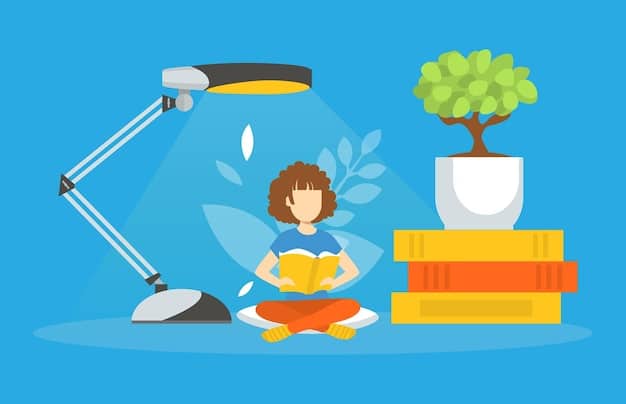Metacognition: Boost Your Learning Potential for 2025 Success

Metacognition, the awareness and understanding of one’s own thought processes, is a critical skill for academic success, enabling students to optimize their learning strategies and achieve a significant advantage in the evolving educational landscape of 2025.
Unlock your full learning potential with metacognition: unlocking your learning potential for a 2025 academic advantage. By understanding how you think and learn, you can develop more effective study habits and achieve greater academic success.
What is Metacognition and Why Does it Matter?
Metacognition, often described as “thinking about thinking,” is the process of becoming aware of and understanding one’s own thought processes. It’s about knowing your cognitive strengths and weaknesses, and using this knowledge to improve your learning strategies.
Why does this matter? In an increasingly complex and rapidly changing world, the ability to learn effectively is more important than ever. Metacognition empowers you to become a more independent, adaptable, and successful learner.
The Two Components of Metacognition
Metacognition isn’t just one thing; it encompasses two key components that work together to enhance your learning:
- Metacognitive Knowledge: This refers to what you know about your own cognitive processes. For example, understanding that you learn best by visual aids versus auditory methods, or recognizing that you struggle with memorizing long lists.
- Metacognitive Regulation: This refers to how you manage and control your cognitive processes. It involves planning your approach to learning, monitoring your progress, and evaluating your effectiveness, and then adjusting your strategies as needed.
Benefits of Metacognition in Academics
Integrating metacognitive strategies into your study routine can lead to a multitude of benefits, setting you up for greater academic achievement. From improved performance to increased confidence, the advantages are substantial.
- Improved Academic Performance: When you understand how you learn best, you can tailor your study strategies to maximize your learning potential.
- Increased Self-Awareness: Metacognition helps you identify your strengths and weaknesses as a learner, allowing you to focus on areas that need improvement.
- Enhanced Problem-Solving Skills: By understanding your thought processes, you become more adept at identifying and solving problems, both in and out of the classroom.
- Greater Independence and Motivation: Metacognition fosters a sense of ownership over your learning, leading to increased motivation and a greater capacity for independent study.
In summary, metacognition is a core skill that enhances your capacity to learn with intention, self-awareness, and efficiency. Mastering this capability can lead to enhanced academic achievements and a more comprehensive grasp of the information.
How to Develop Metacognitive Skills
Developing metacognitive skills is an active process that requires conscious effort and practice. It’s about training yourself to become more aware of your thoughts, feelings, and learning strategies.
Fortunately, there are several techniques you can use to cultivate these skills and become a more effective learner.

Reflection Journals: Your Personal Learning Diary
One of the most effective ways to develop metacognitive skills is to keep a reflection journal. This journal serves as a space for you to document your learning experiences, identify patterns, and track your progress.
After each study session or assignment, take some time to reflect on the following questions:
- What did I learn today?
- What strategies did I use to learn this material?
- What worked well? What didn’t work so well?
- What could I do differently next time?
Think Aloud Protocols: Verbalizing Your Thoughts
Another helpful technique is to use think aloud protocols. This involves verbalizing your thoughts as you work through a problem or complete a task. By talking through your thought process, you become more aware of the strategies you are using and how you are making decisions.
You can do this on your own, or with a study partner, taking turns verbalizing your thoughts and providing feedback to each other.
Self-Questioning Techniques
Self-questioning is a powerful way to monitor your understanding and identify areas where you need more clarification. As you read or study, ask yourself questions like:
- What is the main idea of this passage?
- How does this relate to what I already know?
- What are the key concepts?
- Can I explain this in my own words?
By actively questioning yourself, you force yourself to engage with the material on a deeper level and identify any gaps in your understanding.
With regular practice and intentional application of these methods, you’ll naturally improve your metacognitive abilities, resulting in a more focused and insightful approach to learning.
Metacognitive Strategies for Different Learning Styles
Everyone learns differently, and what works for one person may not work for another. That’s why it’s important to tailor your metacognitive strategies to your individual learning style.
By understanding how you prefer to learn, you can choose strategies that are most effective for you.
Visual Learners: Seeing is Believing
If you’re a visual learner, you learn best through seeing. You might find that diagrams, charts, graphs, and videos are particularly helpful.
Some metacognitive strategies that may work well for you include:
- Creating concept maps to visualize the relationships between different concepts.
- Using flashcards with images to memorize key terms.
- Watching educational videos or documentaries to learn new material.
Auditory Learners: Learning Through Sound
Auditory learners prefer to learn through listening. You might find that lectures, discussions, and audio recordings are particularly effective.
Some metacognitive strategies that may work well for you include:
- Recording lectures and listening to them again later.
- Participating in study groups and discussing the material with others.
- Reading aloud to yourself to reinforce the information.

Kinesthetic Learners: Learning by Doing
Kinesthetic learners learn best through hands-on experiences. You might find that experiments, simulations, and role-playing activities are particularly helpful.
Some metacognitive strategies that may work well for you include:
- Building models or creating prototypes to understand complex concepts.
- Role-playing to practice applying new skills.
- Taking frequent breaks to move around and stay engaged.
Understanding your learning style and matching it with suitable metacognitive strategies can significantly improve your learning outcomes and maximize your academic performance.
Applying Metacognition to Specific Subjects
While metacognition is a valuable skill for learning in general, it can be particularly helpful when applied to specific subjects. By understanding how to adapt your metacognitive strategies to the unique demands of each subject, you can become a more effective and efficient learner.
Let’s take a look at how metacognition can be applied to different subjects.
Mathematics: Understanding the Underlying Concepts
In mathematics, it’s not enough to simply memorize formulas and procedures. You need to understand the underlying concepts and principles.
Metacognitive strategies that can be applied to mathematics include:
- Before attempting a problem, take a moment to understand what the problem is asking and what concepts are involved.
- As you work through the problem, explain your reasoning to yourself or a study partner.
- After completing the problem, check your work and reflect on your approach. Did you use the most efficient strategy? Are there any alternative methods you could have used?
Science: Making Connections and Testing Hypotheses
Science involves understanding complex systems and relationships. Metacognitive strategies that can be applied to science include:
- Before reading a scientific article or textbook chapter, preview the material and identify the key concepts.
- As you read, make connections between the new information and what you already know.
- After reading, summarize the main points in your own words and test your understanding by answering questions or solving problems.
Humanities: Analyzing and Interpreting Texts
The humanities involve analyzing and interpreting texts, historical events, and cultural artifacts. Metacognitive strategies that can be applied to the humanities include:
- Before reading a text, consider the author’s purpose and the historical context.
- As you read, actively question the author’s claims and look for evidence to support your interpretations.
- After reading, discuss the text with others and consider different perspectives.
By applying metacognitive strategies tailored to each subject, you can enhance your learning experience, deepen your understanding, and improve your academic performance across the board.
Overcoming Challenges in Metacognitive Development
Developing metacognitive skills is a journey that can be challenging at times. Like any new skill, it takes practice and persistence to overcome obstacles and achieve mastery.
Here are some common challenges in metacognitive development and strategies for overcoming them.
Lack of Awareness
One of the biggest challenges is simply being unaware of your own thought processes. Many people go through life without ever consciously reflecting on how they learn or make decisions.
To overcome this challenge, make a conscious effort to pay attention to your thoughts and feelings. Keep a reflection journal, practice think aloud protocols, and ask yourself questions regularly.
Resistance to Change
Another challenge is resistance to change. You may be comfortable with your existing study habits, even if they are not the most effective. It can be difficult to break old habits and try new strategies.
To overcome this challenge, start small and focus on making gradual changes. Experiment with different strategies and track your progress. Celebrate your successes and learn from your failures.
Time Constraints
Time constraints can also be a challenge. It takes time to reflect on your learning, experiment with different strategies, and track your progress. You may feel like you don’t have enough time to do all of this.
To overcome this challenge, prioritize metacognitive development and make it a regular part of your study routine. Even just a few minutes of reflection each day can make a big difference.
Recognizing these challenges is the first step in tackling them. With commitment and the right strategies, you can progressively improve your metacognitive abilities and enhance your learning journey.
Metacognition in the Age of Technology and AI
As technology continues to advance and AI becomes more prevalent, the importance of metacognition is only going to increase. In a world where information is readily available and AI can automate many tasks, the ability to think critically, solve problems creatively, and learn independently will be essential.
Metacognition enables you to leverage technology and AI effectively, rather than being overwhelmed by them.
Using Technology to Enhance Metacognition
Technology can be a powerful tool for enhancing metacognition. There are many apps and websites that can help you track your progress, reflect on your learning, and experiment with different strategies.
For example, you can use note-taking apps to organize your thoughts and ideas, mind-mapping tools to visualize the relationships between different concepts, and tracking apps to monitor your study time and habits.
Developing Critical Thinking Skills
In the age of AI, it’s more important than ever to develop critical thinking skills. AI can generate information quickly and efficiently, but it cannot always distinguish between fact and fiction. It’s up to you to evaluate the information you encounter and make informed decisions.
Metacognition helps you develop these skills by encouraging you to question your assumptions, consider different perspectives, and evaluate the evidence before drawing conclusions.
Adapting to a Changing World
The world is changing at an unprecedented pace, and the skills that are valued today may not be the same skills that will be valued tomorrow. Metacognition enables you to adapt to these changes by becoming a lifelong learner.
By understanding how you learn and what strategies work best for you, you can continue to acquire new knowledge and skills throughout your life, regardless of the challenges you face.
The fusion of metacognition with technology and AI presents a formidable opportunity to evolve and refine the learning process, empowering individuals to navigate and excel in the swiftly transforming environment ahead.
| Key Concept | Brief Description |
|---|---|
| 🧠 Metacognition | Thinking about your own thinking to improve learning. |
| ✍️ Reflection Journals | Documenting your learning experiences and strategies. |
| 🗣️ Think Aloud | Verbalizing your thoughts while problem-solving. |
| ❓Self-Questioning | Actively questioning to enhance your understanding. |
Frequently Asked Questions About Metacognition
▼
Metacognition is knowing what you know and knowing what you don’t know. It involves understanding your thought processes and how you learn, enabling you to be more effective.
▼
By understanding how you learn best, you can tailor your study methods to suit your needs. This leads to more focused and productive study sessions, saving you time and improving your results.
▼
It requires conscious effort and practice, but it’s not inherently difficult. Regular reflection and adjusting strategies can gradually build your metacognitive skills over time with persistence.
▼
Yes, apps and tools can assist you in tracking study habits, organizing notes, and visualizing concepts. This facilitates better self-awareness and more refined learning strategies for students.
▼
With AI and rapid changes, the ability to learn independently and critically is vital. Metacognition equips you to adapt, solve problems, and thrive in a rapidly evolving world with success.
Conclusion
By embracing metacognition, you’re not just preparing for exams; you’re equipping yourself with a lifelong skill for continuous learning and adaptation. As we approach 2025, the ability to understand and manage your own learning process will be a key differentiator in achieving academic and professional success.





